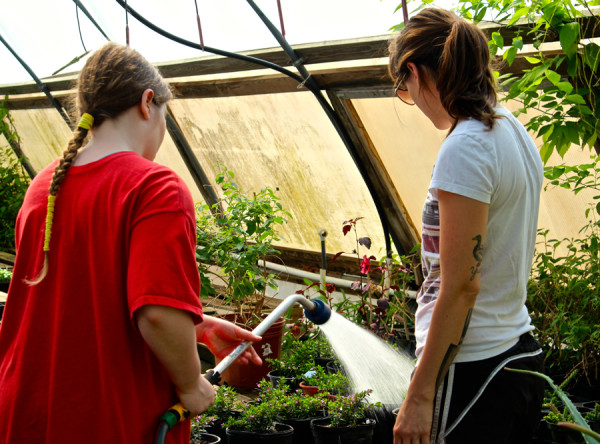Nursery serves as second classroom

 Gardening is restorative. Taking in the fresh air, appreciating a job well done and enjoying nature – all help revive the spirit.
Gardening is restorative. Taking in the fresh air, appreciating a job well done and enjoying nature – all help revive the spirit.
The mental and physical benefits of gardening have been recognized since ancient times. Today, horticultural therapy is used to help people with a broad array of disabilities in rehabilitative, vocational, and community settings.
It is used to improve initiative, language, and cognitive and social skills. Horticultural therapy can also help those with physical disabilities to strengthen muscles, improve balance and enhance coordination.
It’s About Thyme Garden Center on Manchaca Road is helping Austin-area special needs students learn important work skills and problem-solving techniques using horticultural therapy.
The nursery works in partnership with the Life Skills program at Akins High School, which is designed to provide special education students with rehabilitative and vocational skills in a community environment.
Once a week, a small group of Kelsey Williams’ Life Skills students travel by bus to the nursery, where they work with nursery owners, Chris and Diane Winslow and their staff. Depending on the students’ skill levels, students help in the greenhouses, fill and stack pots, sweep and help unload plants. Some high-functioning students are even able to help with planting and transplanting plants.
In addition to their job training experiences, students are interacting with staff and developing key social skills. The nursery also serves as a second classroom where Williams teaches students about plants and conducts science experiments. The students then continue learning about horticulture in the classroom by potting plants and tending their own small school garden.
Williams describes the class as an internship-like program, giving the students invaluable real-life experiences.
“The owners and staff at It’s About Thyme are always so welcoming and friendly with us,” said Kelsey. “The work definitely helps the students, and it also helps others who get to have exposure to these great kids.”
The Winslows have been working with the district’s program for several years, but Chris’ history with horticultural therapy extends far beyond that.
He worked for 26 years as the greenhouse director at Marbridge, a community education and job training facility for the mentally disabled, before retiring in 1998.
Winslow believes their work at the nursery provides the students with a wide range of benefits, both tangible and intangible.
“It gets the kids out of school and into the community,” said Winslow. “They’re getting life skills and training. They work in the vegetable garden and pull weeds and water and learn different skill sets.”
“They’re fun to work with and talk with,” said Winslow. “And it brightens their day a little bit, too”
When asked what she liked most about the experience, one of Williams’ students said she liked the work because growing plants helped her to create something.
“They enjoy being around plants and nature,” added Williams.
Akins has 5 classrooms with a total of 60 students in the Life Skills training program. A few of the other Austin businesses that partner with the Akins Life Skills program include Hobby Lobby and Half Price Books.
For more information about the uses and benefits of horticultural therapy, visit the website of the American Horticultural Therapy Association at AHTA.org.
Local Landscape Designer and Garden Coach Diana Kirby provides landscaping tips at www.dianasdesignsaustin.com and writes a garden blog at www.dianasdesignsaustin.com.
